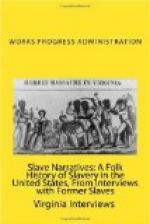“De slave cabins, ’cross a valley from de Big House, was built in rows. Us was ‘lowed to sing, play de fiddles, an’ have a good time. Us had plenty t’ eat and warm clo’es an’ shoes in de winter time. De cabins was kep’ in good shape. Us aint never min’ workin’ for old Marster, cause us got good returns. Dat meant good livin’ an’ bein’ took care of right. Marster always fed his slaves in de Big House.
“De slaves would go early to de fiel’s an work in de cotton an’ corn. Dey had different jobs.
“De overseers was made to un’erstan’ to be ’siderate of us. Work went on all de week lak dat. Dey got off from de fiel’s early on Satu’d’y evenin’s, washed up an’ done what dey wanted to. Some went huntin’ or fishin’, some fiddled an’ danced an’ sung, while de others jus’ lazed roun’ de cabins. Marse had two of de slaves jus’ to be fiddlers. Dey played for us an’ kep’ things perked up. How us could swing, an’ step-’bout by dat old fiddle music always a-goin’ on. Den old Marster come ‘roun’ wid his kin’ly smile an’ jov’al sp’rits. When things went wrong he always knowed a way. He knowed how to comfort you in trouble.
“Now, I was a gardner or yard boy. Dat was my part as a slave. I he’ped keep de yard pretty an’ clean, de grass cut, an’ de flowers’ tended to an’ cut. I taken dat work’ cause I lak’s pretty flowers. I laks to buil’ frames for ’em to run on an’ to train ’em to win’ ‘roun’. I could monkey wid ’em all de time.
“When folks started a-comin’ through talkin’ ‘bout a-freein’ us an’ a-givin’ us lan’ an’ stuff, it didn’ take wid Marster’s slaves. Us didn’ want nothin’ to come ‘long to take us away from him. Dem a tellin’ de Niggers dey’d git lan’ an’ cattle an’ de lak of dat was all foolis’ness, nohow. Us was a-livin’ in plenty an’ peace.
“De war broke out spite o’ how Marster’s Niggers felt. When I seen my white folks leave for war, I cried myself sick, an’ all de res’ did too. Den de Yankees come through a-takin’ de country. Old Marster refugeed us to Virginny. I can’t say if de lan’ was his’n, but he had a place for us to stay at. I know us raised ’nough food stuff for all de slaves. Marster took care o’ us dere ’til de war ended.
“Den he come to camp late one evenin’ an tol’ us dat us was free as he was; dat us could stay in Virginny an work or us could come to Mississippi wid him. Might nigh de whole passel bun’led up an’ come back, an’ glad to do it, too. Dar us all stayed ’til de family all died. De las’ one died a few years ago an’ lef’ us few old darkies to grieve over ’em.
“I don’ know much ‘bout de Klu Klux Klan an’ all dat. Dey rode ’bout at night an’ wore long white ghos’-lak robes. Dey whup folks an’ had meetin’s way off in de woods at midnight. Dey done all kinds o’ curious things. None never did bother ‘bout Marster’s place, so I don’ know much ’bout ’em.
“After de War it took a mighty long time to git things a-goin’ smooth. Folks an’ de Gov’ment, too, seem lak dey was all up-set an’ threatened lak. For a long time it look lak things gwine bus’ loose ag’in. Mos’ ever’thing was tore up an’ burned down to de groun’. It took a long time to build back dout no money. Den twant de gran’ old place it was de firs’ time.




